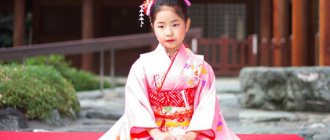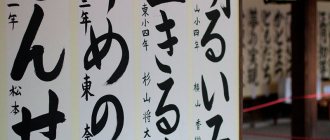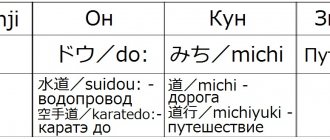Japanese names, their meaning and their origin are of interest to many lovers of the culture of the Land of the Rising Sun. Mysterious and mysterious Japan has always attracted foreigners with its charm and unforgettable traditions. Thanks to the unique genres of graphic novel and animation, which went beyond the borders of Japan, the mysterious world of this distant country was revealed to a wide audience. First of all, it is associated with samurai, delicate falling sakura petals and a centuries-old culture with a special Asian flavor that penetrates many areas of society.
Surnames in Japan
A significant part of the Japanese population received generic names only in the second half of the nineteenth century. Then the reign of Emperor Mutsuhito began. People were given the right to choose their own surname.
Peasants who did not have a broad imagination often used the names of the area in which they were born.
To obtain a surname, they also resorted to fortune telling or asked advice in temples. There have been cases where residents of an entire village became namesakes. Having analyzed existing surnames, we came to the conclusion that only a quarter of family names do not refer to the names of geographical objects.
For example, the most common surnames are:
- Sato - 佐藤 - wisteria gardens in Sano Prefecture.
- Suzuki – 鈴木 – forest of bells.
- Takahashi – 高橋 – near the high bridge.
- Tanako – 田中 – the center of a rice field.
- Watanabe – 渡辺 – near the crossing.
- Ito – 伊藤 – wisteria gardens.
- Yamamoto – 山本 – the foot of the mountain.
- Nakamura – 中村 – the center of the village.
- Ohayashi, or Kobayashi, - 小林 - a small forest.
- Kato – 加藤 – growing wisteria.
Separately, it is worth highlighting the surnames of Japanese monarchs. They are missing. The emperor and the few members of his family do not have them. Exceptions to this rule are made in extremely rare cases. Most often, due to the marriage of princes with commoners, there is a loss of the opportunity to inherit the imperial title and the status of a member of the imperial family. Widows of princes and princesses have the right to receive a surname, also losing the above-mentioned status. If a person joins the emperor's family, he loses his previous surname. This also happened with the wife of the reigning Emperor Akihimoto, Michiko. This marriage was significant in that the heir to the throne took a commoner as his wife, and not a girl from an aristocratic family, and did not lose his title. He later took the throne after his father's death.
A brief excursion into the theory of creating Japanese names
Japanese names always consist of several parts - this is, in fact, a given name and a family name (or surname, if you follow European rules).
But they are always written in a certain order: first the last name, then the first name. In this they differ from the inhabitants of Western Europe, where they write their first name, then their last name, and Eastern Europe, where different spellings are allowed. According to Japanese beliefs, a name should be rare, and therefore you are allowed to come up with names for your own children yourself. There are signs with which names are written; by changing the sequence of these signs or their spelling, the Japanese create new names, adding to their already huge database.
The next rule does not apply to the field of education, but to addressing a person by name. The rule states that with the help of suffixes that are attached to a person’s name, you can express your attitude towards him. For example, the suffix “san” is a symbol of a neutral or respectful attitude towards the interlocutor. The suffix “chan” is similar to diminutives in Russian. This name prefix can be used when communicating with children, close relatives or friends.
Female names
Japan has long been a patriarchal country. From birth, a woman is destined for the role of keeper of the hearth and mother of children. Girls were instilled with the same benefactors as their peers from other medieval countries. It was a joy for the parents to see a beautiful and happy child in front of them. Japanese girl names and their meanings reflect this in full force.
Japanese female names often have hieroglyphs with similar translations. We can see among them those that denote love, tenderness, truth, beauty, tolerance, obedience and others. The wishes were supposed to go to the betrothed girl. These concepts are light and feminine.
The suffix “ko”, also often found among Japanese women, is translated as child or child. The name of the previously mentioned Empress Michiko can be translated as "beautiful child", which is worthy of the wife of the ruler of this country. But modern girls, when communicating informally, can completely omit this suffix. They introduce themselves instead as Yuko, "gentle child", as Yu - "tenderness", and Fujiko - "wisteria child", as Fuji, which translated means "wisteria".
Beautiful and memorable Japanese names are often translated as plant names. It's hard to find a person you wouldn't call Sakura. Given one of the spellings, we can say that these girls are named after the beautiful Japanese cherry tree. Its flowering in spring, hanami, becomes one of the most important events of the year and is accompanied by picnics. This is often the name given to characters in computer games, anime and manga.
We recommend reading! Click on the link:
Beautiful male Islamic names
In addition to cherry, a girl can get her name from willow, peach, chrysanthemum and other plants that charm with their grace or beauty.
Yuri will owe a beautiful lily, Momoko - light pink peach flowers, and Ren - a water lily located in a pond.
Despite the variety of female names in Japan and the desire of parents to somehow distinguish their child, among them the 10 most popular can be noted:
- Himari – 陽葵 – sunrise.
- Hina – 陽菜 – reward.
- Yua – 結愛 – love.
- Sakura – 咲良 – abundant flowering.
- Sakura – 桜 – cherry tree.
- Yuna – 結菜 – graceful.
- Rin – 凛 – cold.
- Aoi – 葵 – mallow, geranium.
- Yui – 結衣 – tying a kimono.
- Rin – 凜 – stern.
Hieroglyphs with the meanings of animals or numbers are now rarely used. They are considered outdated. But there are exceptions to every rule. For example, Chinatsu, in one of his writings, is literally translated as “a thousand years.” It cannot be called unpopular or forgotten. Great examples would be Chinatsu Nakayama, a Japanese writer and former actress, or Chinatu Akasaki, known as an anime and video game voice actress.
Suffixes are used as an indicator for a female personal name. In addition to the previously described “ko”, it can be “mi”, translated as “beauty”, “e” - bay, or hieroglyphs meaning flower, fabric or era.
Japanese boy names starting with M
- Makoto
(诚): Japanese name - unisex, meaning "sincerity, truth" - Mamoru
(守): Means "protector" in Japanese - Manabu
(学): Japanese means "to study" - Masaaki
(真明): Japanese for "true brightness" - Masahiko
(正彦): Japanese for "just a prince" - Masahiro
(正洋): Japanese means "justice flourishes" - Masaki
(昌树): Japanese means "prosperous tree" - Masanori
(正则): Japanese for "model of justice" - Masao
(正男): Japanese for "right person" - Masaru
(胜): Japanese for "victory" - Masashi
(雅): Japanese means "elegant, magnificent" - Masato
(正人): Japanese for "right person" - Masumi
(真澄): Japanese name - unisex, meaning "true clarity" - Michi
(道): Japanese for "path" - Minori
- Minoru
(里): Japanese for "truth" - Mitsuo
(光子): Japanese for "brilliant person"
Male names
Boys in Japan from any class were expected to play the role of protector and breadwinner of the family. Both noble gentlemen and samurai, and farmers raised their successors. This affected the names, or, more precisely, their meanings, for young men.
Popular short Japanese male names. They are wishes for the future man. They want to see him as a protector, successful, great, healthy and perfect. The neighborhood may write hieroglyphs that translate as “son,” “warrior,” or “hero.”
Historically, sons were named after their order of birth.
Especially nowadays, names given initially to first-born children are common. They could be formed in two ways. They could be written in hieroglyphs, translated as a numeral and the word “son” or the word “firstborn”. Another method was to attach the suffix "chi" to the father's name or a qualitative adjective. It means "first son". For example, a guy might be named Daichi. Translated, it means “great first son.”
Every year in Japan, a list of the most popular names for boys is compiled. Unlike women's, men's ratings have not changed much in recent years, but only their positions in it have changed. There are 10 most used names:
- Ren – 蓮 – lotus.
- Hiroto – 大翔 – widespread prosperity.
- Haruto – 陽翔 – sunlight.
- Minato – 湊 – collector.
- Yuma – 悠真 – faithful deer.
- Itsuki – 樹 – tree.
- Yuto – 悠人 – is a truthful person.
- Sota – 奏太 – very efficient.
- Hinata – 陽太 – shining.
- Haru – 悠 – eternal.
Male names also have components that indicate the gender of their bearer. The suffix "o" denotes "masculinity" or "man". "Ro", depending on the hieroglyph, means "clarity" or "son". There are also “ki” - tree, “hiko” - prince or “suke” - assistant.
Japanese boy names starting with A
- Aki
(1 - 秋, 2 - 明, 3 - 晶): translated from Japanese means: 1) “autumn” 2) “bright” 3) “spark” - Akihiko
(明彦): Japanese for "bright prince" - Akihiro
(大畠): Japanese for "great glory" - Akio
(1 - 昭雄, 2 - 昭夫): translated from Japanese means 1) "glorious hero" or 2) "glorious person" - Akira
(1 - 明, 2 - 亮): Japanese name – unisex, meaning 1) “bright” or 2) “clear” - Arata
(新): Japanese for "fresh" - Atsushi
(敦): Japanese means "hard worker"
Borrowed names
In recent years, Japanese culture has been making its way to other countries by leaps and bounds. Not everyone is privy to the subtleties, but many have superficial knowledge. Nowadays it is difficult to surprise a person with words like “anime”, “manga” and the like. A similar phenomenon has its mirror image in the Land of the Rising Sun.
The Japanese are attracted to Western countries: their mentality, habits, and values. Borrowed names from other languages are becoming popular.
Due to phonetics, minor changes in pronunciation may occur. But, knowing the patterns, determining the original source is not difficult.
- Anna – 杏奈;
- Maria – マリア;
- Maria – まりや;
- Emiri – エミリー – Emily;
- Arisu - アリス - Alice.
“Exotic” names are transformed for certain reasons. The Japanese language does not have an "l" sound. In foreign words it is replaced with “r”, like Arisu or Emiri. In the case of borrowing, the ending of the name will not indicate who it is intended for.
Not all Asian languages borrow with the same pronunciation. Chinese is characterized by translating the meaning of a name and then writing it in hieroglyphs, rather than selecting characters according to pronunciation. Each option has its own advantages and disadvantages.
Helpful Tips for Choosing Japanese Names
We can give some recommendations to parents who dream of naming their child a Japanese name. The first advice is to think everything over carefully; mothers and fathers should think not only about themselves, satisfying their own interests, but also about the child too. He will have to grow, study and be brought up in Russian society, where you will not always find a kind-hearted attitude towards a person with a familiar European name, not to mention a very exotic, Japanese one.
Tip two: when choosing a Japanese name for your son, you should definitely check for compatibility with your surname and patronymic. How the life of the heir will turn out is a big question; perhaps he will have to work in a Russian team. In this case, addressing an adult will be appropriate - by first name and patronymic. Therefore, you need to try to choose a euphonious name that can be combined with both the patronymic and surname.
Just imagine how difficult it will be for a child with a full name like: “Ivanov Yasuhiro Fedorovich.”
The third tip is to check from the list what this or that name means, whether it has a negative, negative connotation, or whether the name reads positively in all respects.
Universal names
We recommend reading! Click on the link:
Unusual and very beautiful names for girls
In Japan, as in Russia, it is easy to meet a person with a name suitable for both a girl and a boy. These names include wishes that are appropriate for any person. They can be translated as "sincerity", "obedience" or "generosity". Among them there may be names of precious stones or precious metals.
- Akira – 明 – bright, bright;
- Aoi – 葵 – mallow;
- Kin – 钦 – gold;
- Kohaku – 琥珀 – amber, amber;
- Makoto – 诚 – truth;
- Masumi – 真澄 – clarity;
- Michi – 道 – road;
- Nao – 尚 – noble, noble;
- Haru – 春 – spring;
- Hiroshi – 浩 – prosperity.
Many languages have unisex names. The Land of the Rising Sun is no exception.
Unisex names are becoming more popular every year. Many girls prefer not to give their full names ending in “ko” due to the “old-fashioned” nature of the name, and expectant parents see a similar trend. Therefore, they try to choose fashionable or neutral options in this matter.
Japanese boy names starting with K
- Katashi
(坚): Japanese for "hardness" - Katsu
- Katsumi
(克己): Japanese for "discreet" - Katsuo
(胜雄): Japanese for "child's victory" - Kazuo
(1 - 和夫, 2 - 一男): translated from Japanese means 1) “harmonious person” or “first man” - Kenshin
(谦信): Japanese means "humble truth" - Kichirou
(吉郎): Japanese for "lucky son" - Kin
(钦): Japanese name - unisex, meaning "gold" - Kyoshi
(淳): Japanese for "pure" - Kohaku
(琥珀): Japanese name - unisex, meaning "amber" - Kou
(1 - 幸, 2 - 光, 3 - 康): 1) happiness, 2) light, or peace - Kunio
(国男): Japanese for "compatriot"
Obsolete names
Despite the desire of the Japanese to preserve their traditions from intervention and their careful attitude to the experience of their ancestors, over time, part of what was previously created becomes history. Crafts and old motifs become obsolete and cease to exist. A similar analogy can be made with people's names. They can either simply lose their popularity for a while or completely go out of use, leaving behind a small trace.
Fashion trends can be tracked through various popularity ratings, the number of which does not decrease from year to year.
Among them there are ratings that are calculated by the number of babies named during this period or by the total number of its carriers. In addition to spelling, in the tops you can track popular pronunciations that do not depend on the recording and the chosen alphabet. The latter are less popular. Choice of pronunciation may remain on the conscience of the parents. This provides greater freedom for creativity than the two and a half thousand characters allowed for use by the government. When choosing a name for the future baby, the Japanese carefully study the tops and focus on them before making the final decision.
Shortening your name when meeting someone does not change a person’s passport details. He will even bear the full form of his name against his will. At this stage it is simply unfashionable. It’s another matter when one or a whole group of names goes out of circulation.
Rare Japanese names translated mean animals. These days there are few such names left.
They may be considered old-fashioned, but some of them still have speakers:
- Kame – ウサギ – turtle;
- Tora – 加藤 – tigress;
- Usagi – ウサギ – rabbit;
- Shika – 鹿 – deer.
The famous warrior in a sailor suit from the manga of the same name is familiar to many. The translation reveals an interesting play: Usagi Tsukino's signature hairstyle resembles the large ears of the rabbit that gave her her name. This example is only an exception to the general rule.
Unlike male names, female names rarely use numerals. The exceptions are "first", "seven" and "thousand". The tradition of naming girls in the order of their birth originated in aristocratic families, however, over time it faded away.
Japanese boy names starting with T
- Tadao
(忠夫): Japanese for "faithful person" - Tadashi
(1 - 忠, 2 - 正): translated from Japanese means 1) "loyal" or 2) "truth" - Takahiro
(贵浩): Japanese for "noble" - Takao
(孝雄): Means "respected hero/man" in Japanese - Takashi
(隆): Japanese means "commendable" - Takayuki
(隆行): Japanese means "passing to heights" - Takeshi
(武): Japanese means "cruel, violent," "warrior" - Takumi
(1 - 巧, 2 - 匠, 3 - 工): translated from Japanese means 1) "dexterous", 2) "craftsman", or 3) "skillful" - Tamotsu
(保): Japanese means "protector, patron" - Taro
(太郎): Japanese means "great son" or "eldest son" - Toru
(彻): Japanese for "traveler" - Toshi
(慧): Japanese means "bright, intelligent" - Toshio
(俊夫): Japanese for "brilliant"








